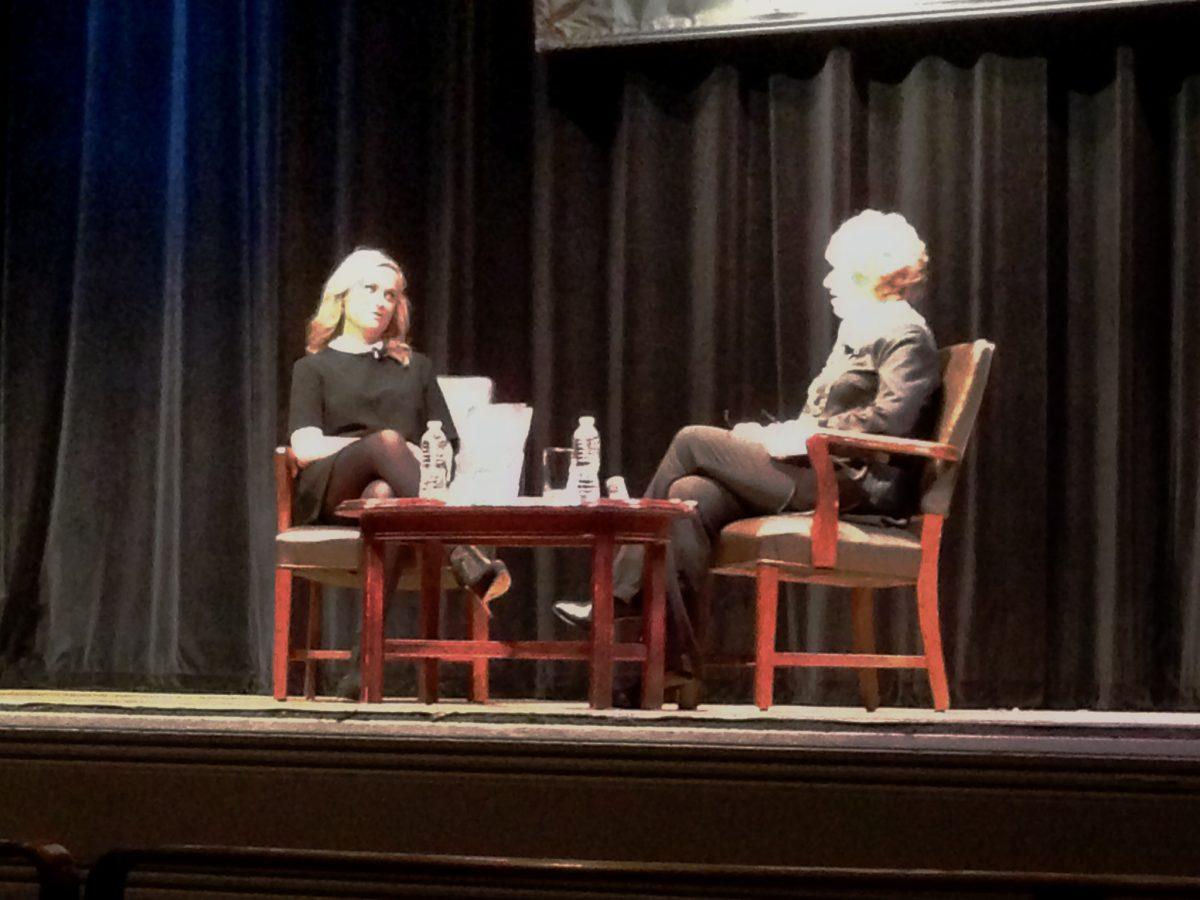Amy Poehler — otherwise known as Leslie Knope of “Parks and Recreation,” Regina George’s mother in “Mean Girls” and our favorite Hillary Clinton impersonator on “Saturday Night Live,” returned to her hometown of Boston last Wednesday as part of the promotional tour for her hugely anticipated book, “Yes Please,” at the Back Bay Events Center. As soon as the doors opened at John Hancock Hall an hour before the show, hundreds of people rushed inside in anticipation of seeing the beloved entertainer live.
Poehler’s moderator for the event was someone very close to her heart: her high school English teacher, Kathy Dalton. Dalton began the event with a sweet introduction, remembering a feisty student with an inquisitive nature and thanking Poehler for her recognition and love for teachers. Dalton welcomed her “former star pupil and present friend.”
Dalton sat with Poehler, immediately joking, “This better be good,” to which Poehler replied, “This is payback for all the times you made me do book reports in your class. Now you have to read one and tell me what you think.”
Their playful banter set the tone for the rest of the conversation, in which the two old friends discussed the details of “Yes Please,” including stories on Poehler’s childhood, her career and even the challenges she faced writing the book.
Dalton asked Poehler to begin the talk by reading the end of the preface of “Yes Please.”
“So here we go, you and me. Because what else are we going to do? Say no? Say no to an opportunity that may be slightly out of our comfort zone? Quiet our voice because we are worried it is not perfect?” Dalton asked. “I believe great people do things before they are ready.”
This was the thesis of their conversation. Poehler was not shy to share that writing this book was a challenge.
“Writing is very blue-collar,” Poehler said. “It is very manual and physical and it’s not smooth. There is no golden book that arrives at your door — you just have to hack away every day and do it.”
Dalton brought up Poehler’s childhood and early years growing up in Burlington, Massachusetts. This small, sleepy town challenged Poehler’s creativity.
“The luxury of having a suburban childhood is you get to create your own danger and mystery,” she said.
According to Poehler, the big sources of drama were “lice, scoliosis and nuclear war” during the 1980s. Thus, she got a head start on creating stories and improvising from these themes.
Dalton brought our attention to a more personal part of the book, asking Poehler how she dealt with low self-esteem in her high school years in a section that Poehler calls “Plain Girl versus the Demon.”
“You’re just this free kid, all elbows and angles and possibilities and then suddenly you hear this voice and it’s not yours – but it’s coming from your own head and sounds like a Stephen King character. It starts to tell you you’re ugly and fat and stupid and you don’t deserve love,” Poehler said.
She went on to talk about how high school was, for her, a time in which looks determined everything. She described it as a time when everyone was telling each other what they looked like. The audience laughed in solidarity with that experience.
Dalton mentioned one of Poehler’s lines about aging as one of her favorite parts of the book.
“Fighting aging is like the war on drugs: expensive, does more harm than good, has been proven to never end,” Dalton quoted from the book, asking her to explain this section. Poehler talked about how youth-obsessed our culture is and how, as a whole, she finds that there isn’t enough appreciation of the gifts that come with aging.
One of these gifts, she says, is her relationships.
“I find that my relationships at 40-plus are really emulsified, juicy relationships with people,” Poehler said. “Because you have a sense of who you are and who you want to be around.”
She went on to say that life, as you age, “is crunchy and complicated and all the more delicious.”
Poehler’s views on life and who she wants to become as she ages have largely been inspired by the work of Dr. Jane Aronson, who named Poehler the arts ambassador of WorldWide Orphans, Aronson’s organization. Poehler described how Aronson has inspired her.
“What I’m now drawn to in general are the kind of people who are big wave-riders — the kind of people who just kind of turn and face the wave,” Poehler said.
Poehler and Dalton kept the audience engaged and laughing as they talked about Poehler’s life as an improviser in Chicago, her friendship with Tina Fey and her life in New York, leading her to NBC’s “Saturday Night Live” and “Parks and Recreation” and her newer web series, “Amy Poehler’s Smart Girls.”
Finally, Dalton and Poehler discussed Poehler’s success and her versatile career in comedy. Poehler shared a bit of advice with the audience that she also writes about in “Yes Please.”
“Become a little more ambivalent about your career. Your career and creativity are different. Creativity is like a really warm Hispanic woman who makes delicious food and laughs at you and you get along with her really nice son. You should be in love with your creativity. Take care of your creativity,” Poehler said. “But your career is like a bad boyfriend. Your career doesn’t call you back; it’s flirting with someone else in front of you; it’s never going to ask you to marry him and it’s never going to leave its wife.”
“Yes Please” was released on Oct. 28 from Dey Street Books.
Photo by Broti Gupta ’16, Features Editor



